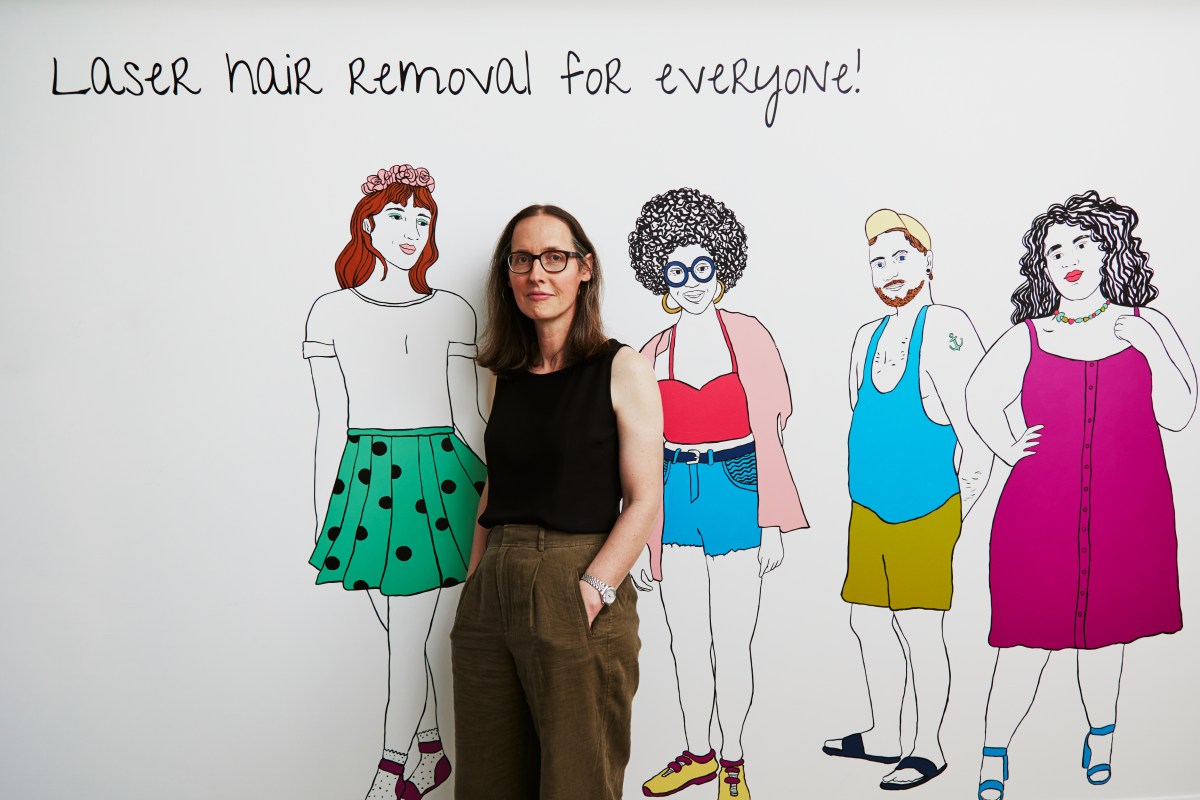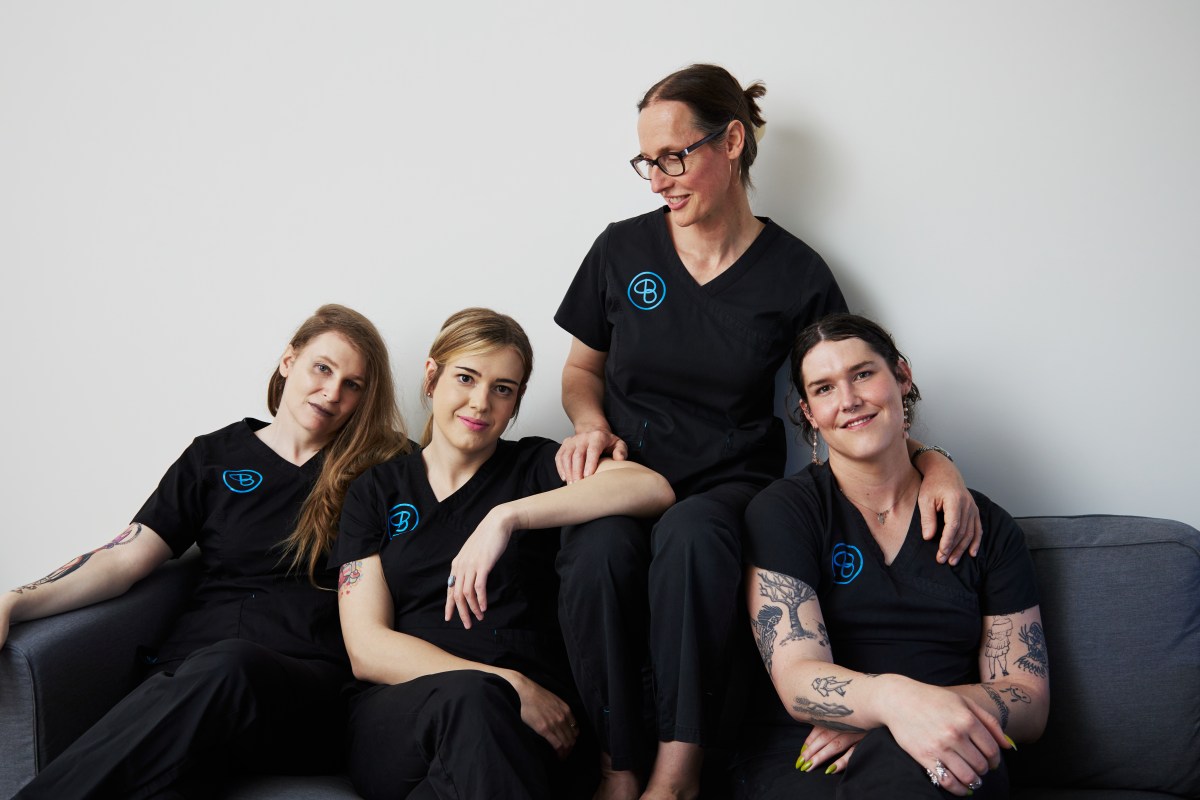I knew I was trans before I found community and I knew I needed to get rid of my beard once I started walking around Queens in women’s clothing. And so, the first trans woman I met after coming out was my electrologist.
For many trans women, electrolysis or laser hair removal are the first steps of medical transition. For many others, they are also a necessity when approaching a later step: bottom surgery.
But as important as these services may be, they aren’t always easily accessible — and even when they are, they might not be attuned to the specific needs of trans women. One company in Toronto is starting to change that.

Djuna Day, owner and founder of Bluebird Laser
Bluebird Laser is a trans-owned and operated studio tucked into the bustling alcove of Kensington Market. When you walk onto their floor, the energy outside drifts away. There’s a sense of calm with inclusive illustrations on the wall and a reading nook with trans literature in the corner. It has the welcome of a spa without the intimidating aura.
“I did all the writing for our website and it was through that process I figured out what I wanted to say, what I had to say,” Bluebird founder Djuna Day told me. “The website is older than any of our spaces, so I’ve tried to make the spaces match.”
Over the last decade, Djuna and Bluebird have been on a journey to get to their ever-growing Kensington location. Djuna came out in 2013 when a cis straight woman named Allison was doing almost all the hair removal for trans women in Toronto. “She was the only one and she had a year-long waiting list,” Djuna recalled. “I waited like everybody else.”
But hair removal was more than just an important step in transitioning for Djuna. It also gave her an idea. She’d previously worked as a carpenter and felt tired of being in a space filled with cis straight men. “I was looking for a way to surround myself with queer folks,” Djuna said. “And I wanted to do some good for people I actually cared about rather than rich ladies from Forest Hill paying $10,000 for dining tables.”
“While I was lying on Allison’s electrolysis table, I started Plan B-ing it in my head. Could I do this work too?” It helped that the schooling was cheap and fast.
The plan was not to start Bluebird. But after applying to every laser clinic in the city and facing obvious employment discrimination due to her transness, she felt called to take action. “If they weren’t willing to employ us, they certainly weren’t serving us or serving us well,” Djuna said. She didn’t see an option other than creating a space for herself — and her community.
It was Allison who allowed Djuna to make the jump from school to suddenly running her own business. Allison lent out her space to Djuna, talked to her about challenges with clients, and coached her until Djuna felt confident she was doing work up to her standard.
Allison also passed along a technique that according to Djuna — and my own observations — was unique to Allison and is now unique to Bluebird. Rather than framing laser and electrolysis as competitors, they utilize both methods, often on a single client depending on where they’re at in the hair removal process. “Laser has things it’s good at and things it cannot do and electrolysis has the same,” Djuna explained. “By starting with laser, Allison could speed up this whole process because laser is just faster. And then once she got most of the dark coarse hair off the face then she could switch to electrolysis and get the rest done.”
This approach is one I discovered on my own. I did a year of painful, slow electrolysis before switching to laser, because I ran out of money. A year of laser made an immense difference — in addition to being way cheaper and way less painful — and made me wonder why I hadn’t done a year of laser first and then finished with electrolysis. When I first came out, I’d been told laser was temporary and electrolysis was permanent, but the truth is more complex.
A history lesson courtesy of Djuna: Electrolysis was invented in the 1850s and for over a century it was the only method to permanently remove hair. But when laser became popular in the 90s, the electrology industry was decimated. Hair removal was geared toward cis white women and, for them, laser pretty much did the trick. In response, electrologists argued laser’s flaws to protect their business. But especially now that laser technology has advanced to work on all skin tones, it’s a very effective method for permanent hair removal.

Djuna and the Bluebird Laser team
While I’m back to electrolysis to finish off the last hairs on my face, this new understanding of laser was a relief to me. I’m planning on getting bottom surgery in about a year and my dread around getting electrolysis on my pubic hair vastly outweighed any fears around the surgery itself. To start instead with laser, and to have it done only by trans technicians at Bluebird has been a relief.
“Forget about the transness and the bottom surgery aspects, getting up on a table and spreading your legs for anybody is a really vulnerable position,” Djuna admitted. “We are trans folks doing this work for trans folks and that helps with lots of our clients.” Djuna said some of their clients may never have had this kind of surgery prep done if not for Bluebird. I understand why. It’s challenging enough in this ideal environment.
But Djuna is quick to point out that what makes Bluebird unique goes beyond vibes and t4t care. Or rather, t4t care has further benefits. “I’m a trans person, I’m also an autistic person, and in this business these have become my super powers,” Djuna said. “I’ve applied my technical brain to how to do laser better than anybody.” This means figuring out completely new laser settings with her team. Once again, the laser industry was first and still is geared primarily toward cis white women. Djuna has thrown out the chart that’s given with the lasers to figure out how to — safely — do better work for all her clients.
“We often have trans clients say they’ve had between 12 to 20 sessions somewhere else and they come to us because they’re not done. We typically finish a trans woman’s face in 8 to 11 sessions. We’re not the cheapest people in town, I know we’re not. It’s expensive to run a business in downtown Toronto. But I think we do better work.”
When Allison was treating trans clients in the 90s, discretion was essential. She worked out of a small office with a medical aesthetic and advertised to trans clients only via word of mouth. But Djuna is no longer willing to settle for working in obscurity. She wants trans people to know about Bluebird and she wants competitors to see what’s possible when all clientele are given the treatment they deserve.
“We have the feel, we have all these trans women working in this beautiful space, but it’s also technical. We’re not just smoke and mirrors, we’re not just branding. There’s something behind this.”
When I first went to Bluebird, my plan was to get a couple sessions while in Toronto for the summer, and then find someone new back in my other city of Brooklyn. But after two sessions with Djuna, I’ve changed my mind. I would drive the nine hours back to Canada for this level of care.

Learn more about Bluebird Laser on their website.



How timely, I am going to a trans owned laser clinic for my first visit tomorrow 😅. I guess it shows how much of a bubble I’m in on social media, I think “everybody” knew you start with laser if you can (hair and skin color permitting) but then have to switch to electro for the stragglers and the hair that was already grey or white… (Yes it’s a race against time for later transitioners…)
It was actually a fairly last minute decision to go with the trans owned/operated place, it’s a bit of a drive, but I figured that between the experience and skill of the operator, and her familiarity with the specific “problem at hand” so to speak, it probably made more sense to go there rather than an in-town chain with a “lifetime” package sold per body part.
Hey Rylie, Djuna here from Bluebird Laser. I’d love to know who you’re going to see. It would be great to connect with other trans folks doing this work! Cheers!
ahhhh the thing about doing laser and electrolysis together makes so much sense. this place seems so cool, i wish i had one near me!